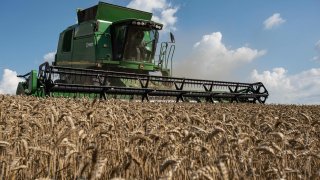
The collapse of a major dam in southern Ukraine sent global prices of wheat and corn higher early Tuesday.
Wheat prices gained 2.4% in early trading Tuesday at the Chicago Mercantile Exchange, to $6.39 a bushel. The cost of corn rose more than 1% (to $6.04 a bushel) and oats gained 0.73% ($3.46 per unit). Prices were higher earlier in the day, but faded.
The destruction of Kakhovka dam and hydroelectric power station, which sits on the Dnieper River in an area that Moscow controls, raised anxiety about a potential disruption to global supplies.
“Ukraine has historically been one of the major exporters in the world wheat market,” Joe Janzen, assistant professor at University of Illinois Urbana-Champaign’s College of Agricultural, Consumer and Environmental Sciences, told The Associated Press, also pointing to the country's historic corn production. “Anytime there’s news out of that part of the world, the market is sensitive to that."
There are massive agricultural fields in Southern Ukraine where the dam burst. The collapse has endangered crops in the country’s breadbasket and threatened drinking water supplies, with officials also warning of a looming environmental disaster — pointing to oil escaping from the dam machinery and significant flooding.
Andrey Sizov, managing director of Black Sea agricultural markets research firm SovEcon, said the dam's collapse looked "like a big escalation with dire consequences and huge headline risk.”
“This could be just the start of the bull run,” Sizov wrote on Twitter.
U.S. & World
The wheat futures rally overnight and early Tuesday lost steam as the day progressed. As of around 1 p.m. ET, for example, the price of wheat was down to $6.28 a bushel.
Wheat prices have been falling throughout the year, following a worldwide spike in food and commodity prices after Russia's invasion of Ukraine in February 2022.
Get a weekly recap of the latest San Francisco Bay Area housing news. Sign up for NBC Bay Area’s Housing Deconstructed newsletter.
Citi commodities analysts called Tuesday’s incident “a reminder of lingering inflationary risk in the goods market.”
It's possible that we'll continue to see temporary jumps in prices following significant news events, like what was seen after the destruction of Kakhovka dam, but Janzen says circumstances are key — and expectations for commodity exports out of Ukraine will likely “continue to diminish as we recognize that Ukrainian production will continue to be severely impaired because of the war.”
Ukraine accused Russian forces of blowing up the Kakhovka dam, while Russian officials blamed Ukrainian bombardment in the contested area — and cutting off water supplies to to Crimea, which which Russia illegally annexed in 2014. It was not possible to verify the claims.
_________
AP Reporter Susie Blann contributed to this report from Kyiv, Ukraine.



